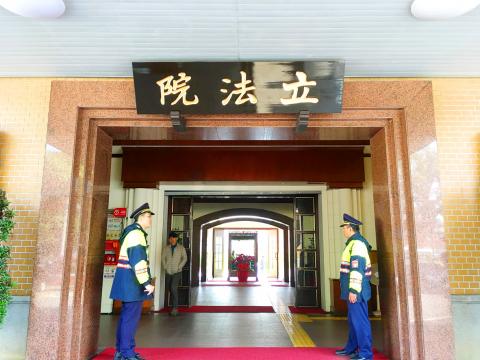A draft amendment to broaden the definition of treason to include collusion with China has been submitted for legislative negotiations, with the first round of cross-caucus talks expected to begin tomorrow at the soonest.
Under the Criminal Code, treason through collusion must involve an “enemy state” and is therefore inapplicable to Taiwanese who spy for China.
The draft amendment, proposed by Democratic Progressive Party Legislator Wang Ting-yu (王定宇), seeks to expand the definition of treason to include collusion with an “enemy” — described in the proposal as any “country, political entity or organization that engages in armed conflict or a military standoff with the Republic of China,” or “posing a military threat to the nation.”

Photo: Lin Liang-sheng, Taipei Times
If passed, individuals caught colluding with China with the intent to subject Taiwan’s territory to its rule could be sentenced to death or life imprisonment.
The Criminal Code’s provisions on treason through collusion have been useless in practice, resulting in a serious flaw in the nation’s security, Wang said.
Considering that the draft involves the safety of 23 million Taiwanese, hopefully legislators across party lines would agree to pass it quickly without touching on the issue of the nation’s status, he said.
Only when the problem with the Criminal Code is solved can the government begin to deal with other issues in national security laws, he said.
Wang had previously cited as an example the case of retired vice admiral Ko Cheng-sheng (柯政盛), whose final assignment was deputy commander of the navy fleet.
Ko was sentenced by the Supreme Court in March 2015 to 14 months in prison for helping China set up a spy ring involving officers under his command and passing on classified military information to China, because the Criminal Code does not address Chinese espionage cases.
The amendment would close this loophole, Wang said.
Since the amendment was proposed in 2017, opposition parties have blocked it many times, he said.
“Now it has finally reached the final step,” he said.
Even if cross-caucus negotiations broke down, the amendment would still be put to a vote on the legislative floor, he said.

A Ministry of Foreign Affairs official yesterday said that a delegation that visited China for an APEC meeting did not receive any kind of treatment that downgraded Taiwan’s sovereignty. Department of International Organizations Director-General Jonathan Sun (孫儉元) said that he and a group of ministry officials visited Shenzhen, China, to attend the APEC Informal Senior Officials’ Meeting last month. The trip went “smoothly and safely” for all Taiwanese delegates, as the Chinese side arranged the trip in accordance with long-standing practices, Sun said at the ministry’s weekly briefing. The Taiwanese group did not encounter any political suppression, he said. Sun made the remarks when

PREPAREDNESS: Given the difficulty of importing ammunition during wartime, the Ministry of National Defense said it would prioritize ‘coproduction’ partnerships A newly formed unit of the Marine Corps tasked with land-based security operations has recently replaced its aging, domestically produced rifles with more advanced, US-made M4A1 rifles, a source said yesterday. The unnamed source familiar with the matter said the First Security Battalion of the Marine Corps’ Air Defense and Base Guard Group has replaced its older T65K2 rifles, which have been in service since the late 1980s, with the newly received M4A1s. The source did not say exactly when the upgrade took place or how many M4A1s were issued to the battalion. The confirmation came after Chinese-language media reported

The Taiwanese passport ranked 33rd in a global listing of passports by convenience this month, rising three places from last month’s ranking, but matching its position in January last year. The Henley Passport Index, an international ranking of passports by the number of designations its holder can travel to without a visa, showed that the Taiwan passport enables holders to travel to 139 countries and territories without a visa. Singapore’s passport was ranked the most powerful with visa-free access to 192 destinations out of 227, according to the index published on Tuesday by UK-based migration investment consultancy firm Henley and Partners. Japan’s and

BROAD AGREEMENT: The two are nearing a trade deal to reduce Taiwan’s tariff to 15% and a commitment for TSMC to build five more fabs, a ‘New York Times’ report said Taiwan and the US have reached a broad consensus on a trade deal, the Executive Yuan’s Office of Trade Negotiations said yesterday, after a report said that Washington is set to reduce Taiwan’s tariff rate to 15 percent. The New York Times on Monday reported that the two nations are nearing a trade deal to reduce Taiwan’s tariff rate to 15 percent and commit Taiwan Semiconductor Manufacturing Co (TSMC, 台積電) to building at least five more facilities in the US. “The agreement, which has been under negotiation for months, is being legally scrubbed and could be announced this month,” the paper said,